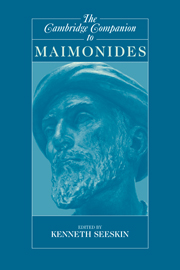Book contents
- Frontmatter
- Introduction
- 1 Moses Maimonides: An Intellectual Portrait
- 2 The Guide and Maimonides’ Philosophical Sources
- 3 Metaphysics and Its Transcendence
- 4 Maimonides’ Epistemology
- 5 Maimonides’ Philosophy of Science
- 6 Maimonides’ Moral Theory
- 7 Maimonides’ Political Philosophy
- 8 Jurisprudence
- 9 Bible Commentary
- 10 Spiritual Life
- 11 Maimonides: Esotericism and Educational Philosophy
- 12 Maimonides--A Guide for Posterity
- Bibliography
- Index
7 - Maimonides’ Political Philosophy
Published online by Cambridge University Press: 28 August 2006
- Frontmatter
- Introduction
- 1 Moses Maimonides: An Intellectual Portrait
- 2 The Guide and Maimonides’ Philosophical Sources
- 3 Metaphysics and Its Transcendence
- 4 Maimonides’ Epistemology
- 5 Maimonides’ Philosophy of Science
- 6 Maimonides’ Moral Theory
- 7 Maimonides’ Political Philosophy
- 8 Jurisprudence
- 9 Bible Commentary
- 10 Spiritual Life
- 11 Maimonides: Esotericism and Educational Philosophy
- 12 Maimonides--A Guide for Posterity
- Bibliography
- Index
Summary
INTRODUCTION
Human beings are social animals according to Aristotelian philosophy. We form societies because we naturally desire the companionship of other human beings. We are also dependent on others for the fulfillment of our basic human needs. Rare is the solitary individual who is capable of producing all that is minimally required for human existence. Thus the “state of nature” for the Aristotelian philosopher is not a presocial state, even if this state is regarded as only a hypothetical construct; it is the social life.
Human society still poses a type of paradox to the Aristotelian philosopher. Although people tend to possess an inherent need to live together, they are incapable of doing so if left to their own devices. The strong would immediately take advantage of the weak. Cruelty and other evil passions would thrive unchecked, inevitably creating a situation at least analogous to Hobbes' state of nature in which life is nasty, brutish, and short. Yet it is nature itself that provides a remedy to this situation. It confers on some individuals the ability to rule others, to organize them in a manner in which they can function in harmony despite their divergent characteristics.
- Type
- Chapter
- Information
- The Cambridge Companion to Maimonides , pp. 193 - 220Publisher: Cambridge University PressPrint publication year: 2005
- 4
- Cited by



